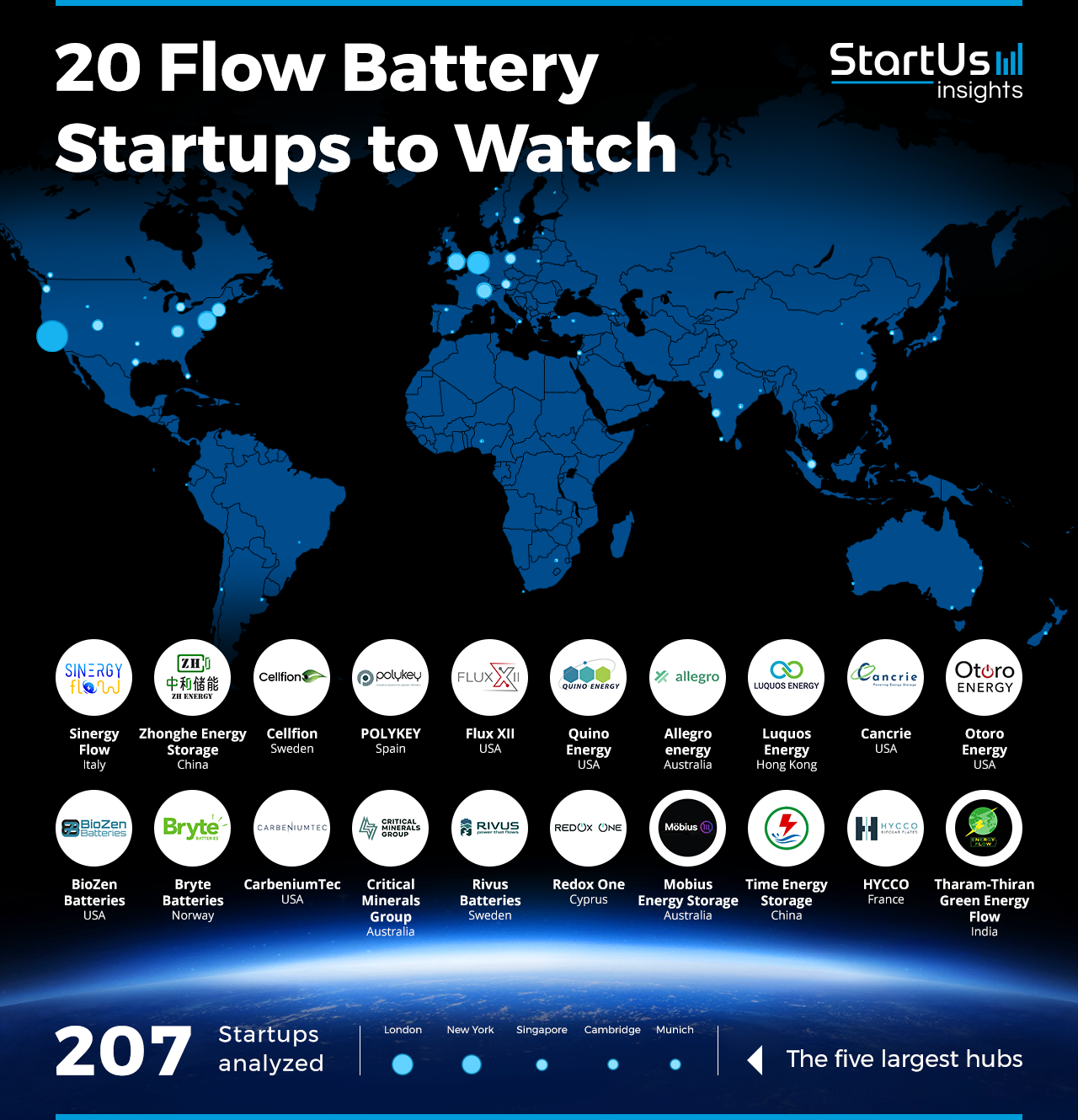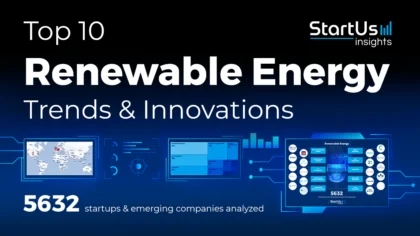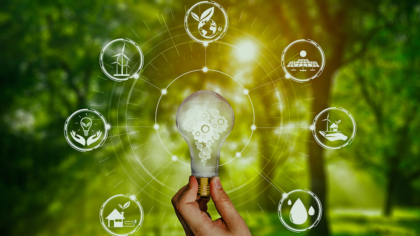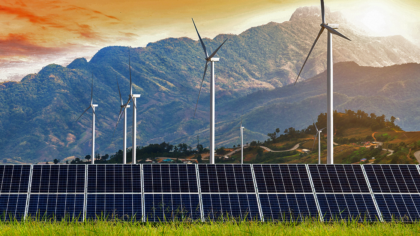Advances like high-performance materials, machine learning, and automation advance flow batteries, a type of rechargeable battery that uses two liquid electrolytes to store energy. By utilizing nanomaterials in the construction of electrodes and membranes, flow batteries achieve higher power densities and longer lifetimes. Machine learning algorithms also optimize battery performance and extend battery life by predicting degradation and adjusting operational parameters accordingly. Explore our curated list of 20 flow battery startups to watch in 2025 and discover the innovators shaping energy innovation.
This article was last updated in July 2024.
20 Flow Battery Startups to Watch in 2025
- BioZen Batteries – Organic Redox-Active Electrolytes
- Bryte Batteries – Vanadium Redox Flow Batteries
- CarbeniumTec – Non-Aqueous Redox Flow Batteries
- Rivus Batteries – Organic Electrolytes for Flow Batteries
- Redox One – Iron-Chromium (Fe-Cr) Flow Batteries
- Mobius Energy Storage – Eco-friendly Flow Batteries
- Time Energy Storage – Aqueous Organic Flow Batteries
- HYCCO – Carbon Fiber Bipolar Plates
- Tharam-Thiran Green Energy Flow – Iron Flow Batteries
- Critical Minerals Group – VRFB Technology
- Sinergy Flow – Multi-Day Redox Flow Battery
- Cellfion – Redox Flow Membranes
- Fluxx XII – Organic Flow Batteries
- Quino Energy – Water-based Flow Batteries
- Zhonghe Energy Storage – Liquid-Flow Batteries
- POLYKEY – Flow Battery Polymer
- Allegro Energy – Long-Duration Energy Storage
- Luquos Energy – Scalable Flow Battery Technology
- Cancrie – Waste-To-Battery Material
- Otoro Energy – Megawatt-Scale Flow Battery Systems
Global Startup Heat Map highlights 20 Flow Battery Startups to Watch
Through the Big Data & Artificial Intelligence (AI)-powered StartUs Insights Discovery Platform, covering over 4.7M+ startups & scaleups globally, we identified 207 Flow Battery startups. The Global Startup Heat Map below highlights the 20 Flow Battery startups you should watch in 2025 as well as the geo-distribution of all flow battery startups & scaleups we analyzed for this research.

Want to explore all 200+ flow battery startups & scaleups?
Based on the heat map, we see high startup activity in the USA, followed by the UK and Germany. These flow battery startups work on solutions ranging from grid-scale energy storage and novel battery materials to battery recycling and organic flow batteries.
As the world’s largest resource for data on emerging companies, the SaaS platform enables you to identify relevant technologies and industry trends quickly & exhaustively. Based on the data from the platform, the top startup hub in the flow battery ecosystem is London, followed by New York City and Singapore. Cambridge and Munich are the other major flow battery startup hubs. The 20 hand-picked startups highlighted in this report are chosen from all over the world and develop solutions for better battery performance, battery recycling, and bio-based battery materials.
Explore 20 Flow Battery Startups to Watch (2025)
BioZen Batteries offers Organic Redox-Active Electrolytes

BioZen Batteries, a USA-based startup, enables long-duration energy storage for grid-scale applications. The startup utilizes its Redoxolyte electrolyte, derived from sustainable carbon-based sources. This solution ensures utility-scale discharge, low degradation, non-flammability, non-toxicity, and ethical sourcing. The solution is a cost-efficient alternative to conventional vanadium-based technologies. The startup replaces resource-intensive lithium and vanadium with its eco-friendly electrolyte offering extended storage, scalability, safety, and affordability.
Bryte Batteries manufactures Vanadium Redox Flow Batteries

Norwegian startup Bryte Batteries specializes in vanadium redox flow batteries (VRFBs) for grid-scale energy storage. Utilizing vanadium electrolytes, its VRFBs offer a cost-efficient and scalable solution for long-duration energy storage. These batteries offer high efficiency, a long lifespan, and minimal maintenance. Bryte Batteries thus offers sustainable and reliable energy storage solutions with their VRFBs that provide grid flexibility. They also overcome the limitations of solid-state batteries, leading to improved overall efficiency and reliability in applications like peak shaving and flexibility markets.
CarbeniumTec offers Non-Aqueous Redox Flow Batteries

CarbeniumTec, a USA-based startup, provides non-aqueous redox flow battery (NARFB) technology for advanced energy storage. Utilizing non-aqueous electrolytes, the startup’s CarbElectroFlow technology enhances energy density and efficiency, outperforming traditional aqueous flow batteries.
Addressing challenges of aqueous RFBs, CarbeniumTec’s NARFBs are metal-free, non-toxic, offer fast charging, minimal cross-contamination, and cost-effectiveness. These batteries are suitable for large-scale energy storage. Being environmentally friendly they are also ideal for harsh conditions. They ensure safety, and sustainability, and mitigate intermittency challenges in renewable energy production.
Rivus Batteries provides Organic Electrolytes for Flow Batteries

Rivus Batteries is a startup based out of Sweden that provides large-scale energy storage with organic flow batteries. Its technology leverages organic electrolytes, providing a sustainable and cost-effective solution for storing renewable energy on a massive scale. Rivus’s organic flow batteries offer advantages such as scalability, cost efficiency, non-toxicity, scalability, consistent supply, safety, and environmental sustainability.
Redox One makes Iron-Chromium (Fe-Cr) Flow Batteries

Cypriot startup Redox One offers sustainable energy solutions with its Fe-Cr redox flow battery technology. The startup leverages an efficient Fe-Cr electrolyte for reliable energy storage. Redox One enables — economical Fe-Cr electrolytes, battery longevity, and safe chromium usage for energy storage. Moreover, its large-scale storage capacity provides a consistent power supply from intermittent sources and facilitates a transition to cleaner energy. The startup’s solutions are thus useful for renewable energy integration.
Mobius Energy Storage develops Iron Slurry Flow Batteries

Australian startup Mobius Energy Storage develops advanced iron slurry flow batteries (ISFB) that suit 8-12 hour discharge applications. They use no rare materials and remain non-flammable and environmentally safe. Each container houses a 100KW/1MWH battery to provide a flat discharge profile for renewable energy generators and utility providers.
The system operates with positive and negative liquid electrolytes stored in separate tanks to create a chemical imbalance when charged. During discharge, the system naturally balances itself and produces energy without mixing electrolytes with a special membrane. It assists commercial and industrial sectors, utility transmission and distribution providers, and renewable energy generators.
Time Energy Storage produces Aqueous Organic Flow Batteries

Chinese startup Time Energy Storage uses aqueous organic flow batteries (AOFBs) to feature a unique electrolyte composed of organically synthesized substances. It is dissolved in water or saline solutions to enhance safety and minimize fire risks.
The anion exchange membrane (AEM) component of AOFBs manages the activity between electrodes and prevents short circuits while facilitating efficient ion transfer during battery operation. Time Energy Storage’s AOFBs offer high energy efficiency, cost-effectiveness, and safety solutions to large enterprises in the electricity, oil, chemicals, and transportation sectors.
HYCCO develops Carbon Fiber Bipolar Plates

French startup HYCCO creates ultra-light, durable, and compact carbon fiber bipolar plates using fuel cell technology. Its ultra-thin, chemically resistant, and flexible carbon fiber material enhances fuel cell stack power density. For this, it combines the thinness of metallic plates with the lightness of carbon fiber and the longevity of composites.
This results in more compact, long-lasting, and lighter fuel cells, with a scalable manufacturing process suited for mass production. HYCCO’s technology can be adopted by industries focusing on heavy mobility. By significantly reducing stack weight and achieving unprecedented power density, HYCCO enables rapid decarbonization in the mobility market.
Tharam-Thiran Green Energy Flow develops Iron Flow Batteries

Indian startup Tharam-Thiran Green Energy Flow develops energy storage solutions for large stationary applications. Its double membrane fully redox iron flow battery uses the stability and abundance of iron to store energy efficiently. Thus, it makes large-scale energy storage needs ideal. The technology operates by cycling iron in different oxidation states and provides a durable and cost-effective energy storage solution.
Entities such as renewable energy power plants, large residential complexes, and buildings requiring constant power supply can rely on this technology. TharamThiran Green Energy offers a reliable, sustainable, and scalable energy storage option, ensures uninterrupted power flow, and supports the transition to renewable energy sources.
Critical Minerals Group advances VRFB Technology

Critical Minerals Group is an Australian startup that specializes in technology for carbon-neutral processes and VRFBs, emphasizing sustainability in critical mineral extraction. The startup offers clean extraction methods and long-duration storage solutions for renewable energy grids. The startup helps in tackling crucial challenges such as sustainable mining and grid-scale energy storage. It offers clean extraction, long-duration energy storage solutions for renewable energy grids, sustainable cycles, and scalable solutions.
Interested in exploring all 200+ flow battery startups & scaleups?
Sinergy Flow creates a Multi-Day Redox Flow Battery
 Sinergy Flow is an Italian startup that develops a modular and scalable redox flow battery for energy storage on a multi-day basis. It features a customizable energy-to-power (E/P) ratio that allows utilities to tailor battery performance based on specific project needs. This allows for usage of up to 10 hours at a time. Sinergy Flow also uses sulfur, a byproduct of the petrochemical industry, in its battery technology. This ensures sustainability and lower construction costs. Sinergy’s redox flow battery, with its longer lifetime and simple structure, makes it an efficient and sustainable energy storage solution.
Sinergy Flow is an Italian startup that develops a modular and scalable redox flow battery for energy storage on a multi-day basis. It features a customizable energy-to-power (E/P) ratio that allows utilities to tailor battery performance based on specific project needs. This allows for usage of up to 10 hours at a time. Sinergy Flow also uses sulfur, a byproduct of the petrochemical industry, in its battery technology. This ensures sustainability and lower construction costs. Sinergy’s redox flow battery, with its longer lifetime and simple structure, makes it an efficient and sustainable energy storage solution.
Cellfion manufactures Redox Flow Membranes
 Swedish startup Cellfion creates bio-based membranes for electrochemical energy storage and conversion devices. The startup makes membranes from nano cellulose with high mechanical strength, biocompatibility, and ion selectivity. This makes it an ideal material for redox flow membranes. The startup manufactures these membranes for organic redox flow batteries and polymer electrolyte membrane (PEM) electrolyzers.
Swedish startup Cellfion creates bio-based membranes for electrochemical energy storage and conversion devices. The startup makes membranes from nano cellulose with high mechanical strength, biocompatibility, and ion selectivity. This makes it an ideal material for redox flow membranes. The startup manufactures these membranes for organic redox flow batteries and polymer electrolyte membrane (PEM) electrolyzers.
These batteries also facilitate large-scale energy storage to support the grid, particularly with intermittent renewable energy sources. Cellfion’s bio-membranes ensure higher performance, lower cost, and reduced environmental impact during flow battery manufacturing. This, in turn, allows energy providers to leverage long-term energy storage with minimal performance degradation.
Flux XII offers Organic Flow Batteries

Flux XII is a US-based startup that makes organic flow batteries for grid energy storage. The startup utilizes organic molecules containing carbon (C12) as the active materials in its battery electrolytes. It then dissolves the carbon molecules in benign, pH-neutral water to power the flow battery system.
This approach eliminates the need for mining or hectic supply chains, making renewable energy integration more reliable and affordable. Flux XII’s batteries offer long-duration energy storage solutions for the grid, as well as support peak shaving, frequency regulation, and microgrid balancing. These applications benefit energy stakeholders by reducing emissions and enhancing grid reliability.
Quino Energy develops Water-based Flow Batteries
 US-based startup Quino Energy creates water-based flow batteries for grid-scale energy storage. The startup leverages organic quinone molecules that easily transition between reduced hydroquinone and oxidized quinone forms as electrolytes. Quino Energy produces quinones sustainably from dyestuffs, making it a cost-effective option.
US-based startup Quino Energy creates water-based flow batteries for grid-scale energy storage. The startup leverages organic quinone molecules that easily transition between reduced hydroquinone and oxidized quinone forms as electrolytes. Quino Energy produces quinones sustainably from dyestuffs, making it a cost-effective option.
Even after decomposition, the decomposed quinones are capable of restoration to the original flow battery reactants by subjecting them to mild oxidation periodically. These flow batteries also feature better fire safety as the battery reactants dissolve in water. Moreover, the startup’s battery does not produce any hydrogen gas during charging, making it more efficient and sustainable for energy storage.
Zhonghe Energy Storage provides Liquid-Flow Batteries
 Zhonghe Energy Storage is a Chinese startup that produces liquid-flow batteries for grid energy storage. These batteries store energy in liquid electrolytes and pump it through a cell stack to generate electricity. This technology enables better performance and high cycle times, making it suitable for energy storage for up to 6 to 12 hours.
Zhonghe Energy Storage is a Chinese startup that produces liquid-flow batteries for grid energy storage. These batteries store energy in liquid electrolytes and pump it through a cell stack to generate electricity. This technology enables better performance and high cycle times, making it suitable for energy storage for up to 6 to 12 hours.
The startup also incorporates high-performance electrodes and low-cost diaphragms to reduce system costs. Additionally, Zhonghe Energy Storage develops a calculator tool, NeLCOS, for optimizing energy storage systems. Overall, these solutions enable energy providers to use renewable energy sources more efficiently and allow consumers to reduce electricity costs.
POLYKEY develops a Flow Battery Polymer
 POLYKEY is a Spanish startup that offers a polymer for electrochemical energy storage devices such as flow batteries and supercapacitors. In comparison to current materials, the startup’s material is lighter, enables higher energy storage, and performs better at high temperatures.
POLYKEY is a Spanish startup that offers a polymer for electrochemical energy storage devices such as flow batteries and supercapacitors. In comparison to current materials, the startup’s material is lighter, enables higher energy storage, and performs better at high temperatures.
The startup uses plastic waste as a sustainable and cost-effective feedstock for its polymer. POLYKEY bases this technology on organic redox-active molecules that are abundant, cost-effective, and environmentally friendly. The startup’s products thus allow utilities to leverage large-scale and long-duration energy storage to facilitate renewable energy integration, grid stabilization, and power backup.
Allegro Energy advances Long-Duration Energy Storage
 Australian startup Allegro makes a redox flow battery technology for long-duration energy storage (LDES). The startup leverages a non-corrosive and non-flammable electrolyte, making the battery safe and sustainable. It is capable of releasing energy for over 4 hours and has a lower levelized cost of storage (LCOS) than traditional energy storage methods. Energy providers customize the startup’s technology to meet specific energy storage needs, making it a flexible solution for a variety of applications. Allegro’s redox flow battery offers higher energy density and adapts to any environment.
Australian startup Allegro makes a redox flow battery technology for long-duration energy storage (LDES). The startup leverages a non-corrosive and non-flammable electrolyte, making the battery safe and sustainable. It is capable of releasing energy for over 4 hours and has a lower levelized cost of storage (LCOS) than traditional energy storage methods. Energy providers customize the startup’s technology to meet specific energy storage needs, making it a flexible solution for a variety of applications. Allegro’s redox flow battery offers higher energy density and adapts to any environment.
Luquos Energy makes Scalable Flow Battery Technology

Luquos Energy is a Chinese startup that develops scalable flow battery technology for energy storage. The startup’s aqueous electrolyte and earth-abundant elements store and provide renewable energy on demand. It is safe as the non-flammable electrolyte and non-toxic active materials eliminate the risk of fire and environmental pollution.
The technology features a longer cycle life than conventional lithium-ion batteries, resulting in lower costs and better performance. It also provides steady power output for a longer period of time, making it ideal for supporting EV solar chargers. This also enables uninterrupted power supply for critical facilities such as data centers and base stations.
Cancrie develops a Waste-To-Battery Material
 US-based startup Cancrie produces an advanced material made from waste for vanadium redox flow batteries (VFRB). It is a drop-in solution that comes from bio-based renewable resources, such as biomass and agricultural waste. Battery manufacturers leverage the startup’s patented technology and tailor it for different applications, such as batteries and capacitors.
US-based startup Cancrie produces an advanced material made from waste for vanadium redox flow batteries (VFRB). It is a drop-in solution that comes from bio-based renewable resources, such as biomass and agricultural waste. Battery manufacturers leverage the startup’s patented technology and tailor it for different applications, such as batteries and capacitors.
Moreover, it enhances the electrochemical properties and durability of the electrodes to improve VFRB performance and efficiencies. The startup also minimizes the use of precious metals and toxic chemicals to reduce the environmental impact and cost of energy storage devices. This enables utilities to utilize VRFBs for electrical peak shaving, load leveling, and more in large stationary energy storage situations where volume and weight are not limiting factors.
Otoro Energy builds Megawatt-Scale Flow Battery Systems

US-based Otoro Energy develops megawatt-scale flow battery systems to enable LDES, integrate renewables, and enhance grid reliability. The LDES systems ensure power availability during inactive solar and wind sources. This technology supports renewable integration by storing excess energy and supplying it back to the grid during demand peaks. Otoro Energy’s solutions defer costly transmission infrastructure expansion by providing localized energy storage. The systems assist utilities, commercial sectors, and renewable energy producers by enhancing grid resiliency and reliability.
Discover All Emerging Energy Startups
The energy startups showcased in this report are only a small sample of all startups we identified through our data-driven startup scouting approach. Download our free Energy Innovation Report for a broad overview of the industry or get in touch for quick & exhaustive research on the latest technologies & emerging solutions that will impact your company in 2025!



![Dive into the Top 10 Energy Industry Trends and Innovations [2025]](https://www.startus-insights.com/wp-content/uploads/2025/03/Energy-Trend-SharedImg-StartUs-Insights-noresize-420x236.webp)






